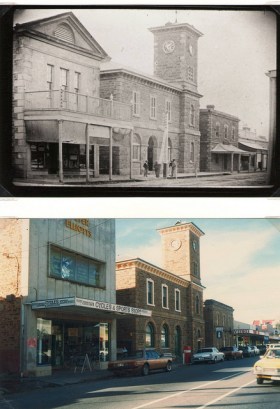To preserve, create, and build
Produced by David Ward on June 21, 2017
Tags - About - About Us - Building Communities - Community - Creating History - Event - Gawler - Oral History - Preserving History

After 6 months of hard work the Gawler Oral History Project is almost ready to launch – we’re about to make history!
The Gawler Oral History Project (or GOHP for short) is a new idea, and with the potential of new digital technology to easily record and store the stories and experiences of individuals, groups and organisations that make up our community, collecting oral history has never been easier.
With the backing of the GBA, and the generous assistance of the Gawler History Team and the National Trust (Gawler Branch), we’ve gathered together a dedicated team of volunteer members who create the Gawler Oral History Project, and we’re still looking for more helpers.
But why, I hear you ask, should we collect all these stories? Why do the GOHP at all, is collecting and preserving oral history that important?
Well, the GOHP is not just about preserving the past. We’re also here to create history of the future, and to build our community in the present.

Preserving
The first and most obvious purpose of the GOHP is the preservation of history. The stories we collect are not just the personal experiences of those who we interview (as important as that is), but they are also a record of how things used to be. They uncover details that would otherwise be have been lost – people’s attitudes, customs, ways of doing things – the regular parts of life which often disappear from the written record as time and history move on.
And it is because so many of the details of the way people lived and worked and went about their days get lost, that the GOHP is needed to preserve our history.

Creating
History is drawn from the sources available, and the GOHP draws on the stories and experiences of locals to build a resource that creates an image of our community for future generations to see.
For a long time – until the more recent advent of archaeology – history was what we were told it was by those who could pass on the stories of their time, often in written form. Recording these stories was laborious and expensive, and consequently we hear of the kings and emperors, of queens and generals, but very little about how virtually everyone else lived!
But with new digital technology, it has never been easier or cheaper to collect everyone’s story, and to have everyone’s voice participating in the way future generations see us.
By recording the stories and experiences of our community, we are actively creating an historic record that will influence the way Gawler is viewed through the lens of time, and your memories will become our history.
Building
But the GOHP is not just about preserving the past for the future, it is also about the present.

As we build our collection of interviews and podcasts, the stories that are told – the memories and experiences – will begin to intersect both with other oral history recordings, and with the memories and experiences of our listeners. People may have gone to the same school, played in the same park, or lived on the same street, and the stories of our interviewees, and indeed our listeners, will become connected through the common ground which is Gawler.
Through sharing our stories and listening to the stories of others we can see the connections that link us with our neighbours, the ties that bind us together as one and build our community strong.
With a dedicated team of volunteer members, and the support of the GBA, the Gawler History Team, and the National Trust (Gawler Branch), the Gawler Oral History Project is ready to launch, to set our devices to record, and to begin collecting the stories of Gawler. We’re ready to make your memories our history.